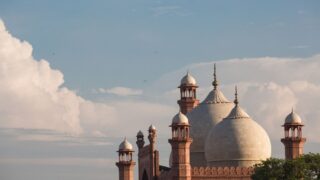When we fast in Ramadan, we inevitably think of those who feel hunger every day of the year. We experience hunger and look forward to breaking our fast with the food we eat at iftar. Can you imagine if no food was available at sunset? Millions of people face this crisis — their hunger does not end at sunset.
We know the grim statistics: About 850 million people in the world are undernourished (that is one in every six human beings), and 5.6 million children under the age of five die from hunger-related illnesses each year. Yet, our world produces enough food to feed twice the global population (Raja).
So why are people hungry? A lack of power and justice, not of food, causes hunger. Today, world hunger is directly linked to what and how the developed world eats.
Prophet Muhammad (peach and blessings be upon him) said, “If any one fulfills his brother’s needs, Allah will fulfill his needs; if one relieves a Muslim of his troubles, Allah will relieve him of his troubles on the Day of Resurrection” (Al-Bukhari and Muslim). This Ramadan, strive to change your eating habits so you can help end hunger. Here are eight easy and effective ways to begin.
1. Eat more fruits and vegetables. Livestock consumes 80 percent of the grain the United States produces. In Mexico, where poverty and hunger are abundant, 45 percent of the nation’s grain is fed to livestock (Manning). In most industrial nations, corporations raise animals in factory farms that consume huge quantities of grain, water, hormones, and electricity, and that produce tonnes of toxic wastes. A diet high in grain-fed meat consumes two to four times more land than a vegetarian diet. If everyone ate meat at the North American rate, the world would run out of farmland and food!
Try to reduce your share of the world’s food and energy by eating more fruits and vegetables and less meat this Ramadan.
2. Eat locally grown food. The farther food travels before it reaches your plate, the less money the rural farmer retains. When you purchase coffee grown in Uganda, for example, 10 percent of the profit goes to the farmer and 90 percent is consumed by giant corporations that import and process the coffee. The farther food travels, the more energy it consumes for pesticides, preservatives, related phases (ripening, packaging, and processing), transportation, and sales. The food processing industry in the United States consumes ten calories of fossil fuel energy for every calorie of food energy it produces (Manning).
In North America and other rich countries, people like to have all their fruits and vegetables available year-round. To meet this demand, governments of developing countries subsidize and encourage farmers to plant one-crop monocultures for export. This leaves small farmers unable to grow food for their families and communities. With one crop to rely on, farmers in the developing world become vulnerable when market prices fall or when a disease hits their crop. Monocultures need high inputs of hazardous pesticides that threaten the health of farmers and their environment.
This Ramadan, forget the guavas and mangoes if they’re not locally grown. Find the local farmer’s market, buy what’s in season, and break your fast with a fresh fruit salad. When you buy local, you avoid an unjust food trade system that keeps the poor hungry.
3. Choose organic food. Conventional farming, especially monocultures, requires high inputs of pesticides, fertilizers, and irrigation that eventually degrade soils. About 30 million hectares from the world’s 240 million irrigated hectares are severely damaged by salt buildup. Almost a third of the world’s cropland is abandoned due to soil erosion (“Feeding a World of 8 Billion”). A lack of land forces many farmers to clear and destroy forest land that cannot sustain agriculture. Pesticides and fertilizers trap farmers in a cycle of spending more and more on chemical inputs as insects become immune and the land loses its fertility. Eventually, small farmers in developing countries fall into debt or degrade their land, and they are forced into poverty.
Organic farming uses natural methods to protect the quality of agricultural land and soil and to ensure that the land can continue to produce food. Organic agriculture may be the best way to ensure a continuous world food supply and to protect the health of farmers and consumers. Make every organic product you buy this Ramadan support farmers who care about hunger and the environment.
4. Buy fair-trade food. The fair-trade movement eliminates injustices in the trade system and guarantees farmers a minimum price for their crops, enough to sustain their families. Fair-trade shortens the market chain for products, allowing the farmer to receive a higher proportion of the profit. Fair trade standards require the farmer to follow environmentally and socially ethical agricultural practices. A portion of the profit from fair-trade products funds social development projects in the farmer’s community.
Currently, fair-trade coffee, tea, chocolate, fruit, rice, and spices are becoming more and more available in various markets around the world. Next time you go to the grocery store, look for the fair-trade logo. Every fair-trade purchase prevents hunger in a poor farming community.
5. Avoid genetically modified food. Genetically modified (GM) crops are “owned” by corporations that have a monopoly on the seeds. Farmers cannot save the seeds for replanting. They must purchase new seeds from the company each year and must succumb to the corporation’s regulations and prices. As more and more crops become genetically modified, our food becomes a “product” rather than a renewable resource. The health and environmental impact of GM crops is still not clear as more tests still need to be conducted to assess their true effects.
This Ramadan, avoid GM products to prevent our food from becoming a corporate commodity, controlled by a few large companies.
6. Buy less, waste less food. On average, an individual in a developed nation consumes twice as much grain, twice as much fish, and three times as much meat, as an individual in a developing nation (“How Much Do We Consume”).
Prophet Muhammad (peace and blessings be upon him) warned us that “No person fills a container worse than his stomach. A few morsels that keep your back upright are sufficient. If you have to [eat a lot], then you should keep one-third for food, one-third for drink, and one-third for his breathing” (At-Tirmidhi).
Along with overeating, North Americans waste large amounts of food. About 30 percent of consumable food in the United States is lost in retail, food service, and consumers. The Qur’an tells us to eat and drink: but waste not by excess, for Allah loves not the wasters (Al-A`raf 7:31).
This Ramadan help end hunger with a commitment to buy less, eat less, and waste less food.
7. Choose charities that make people independent. Food aid from rich nations does not help end hunger. Rich nations often dump surplus grain on poor nations, as “food aid.” This “aid” rises and falls to maintain the market price for commodities in rich countries.
Food dumping reduces the price of farmers’ crops in developing nations. Farmers cannot sell their produce and earn enough to invest in future crops. Poor farmers need long-term solutions. They need investments and interest-free loans to buy land or equipment so they can diversify their crops and survive times of drought or falling prices.
When you send zakah (i.e. Islamic obligatory alms) overseas, choose a charity that helps people become independent, rather than dependent on aid.
8. Write letters. Change the world with your words. Encourage governments to cancel the high-interest debts owed to them by developing countries. Debt repayments to rich countries prevent poor countries from spending on fighting poverty and hunger and on improving the welfare of their citizens.
The Qur’an warns, O believers, fear Allah; and give up riba [interest] if you are believers. If you do it not, then be warned of war from Allah and His Messenger: But if you repent, then you shall have your capital: Deal not unjustly, and you shall not be dealt with unjustly. (Al-Baqarah 2:278–279).
Start a family letter-writing campaign this Ramadan to eliminate debt and hunger.
Hunger in the world is intimately connected with what we choose to buy and eat. This Ramadan, decide as a family to earn extra godly rewards by changing the way you eat so you can impact hunger. The Prophet (peace and blessings be upon him) said, “If any Muslim feeds a Muslim when he is hungry, Allah will feed him with fruits of Paradise” (Abu Dawud).
By Shehnaz Toorawa
Sources:
“Feeding a World of 8 Billion.” People and Planet. 1 May 2004. Accessed 10 Sep. 2007.
“How Much Do We Consume.” Accessed 10 Sep. 2007.
Manning, Richard. “The Oil We Eat.” Harper’s Magazine. Feb. 2004: 37–45.
Raja, Kanaga. “Hunger Problem on the Rise, Says UN.” People and Planet. 22 June 2207. Accessed 3 Sep. 2007.

















